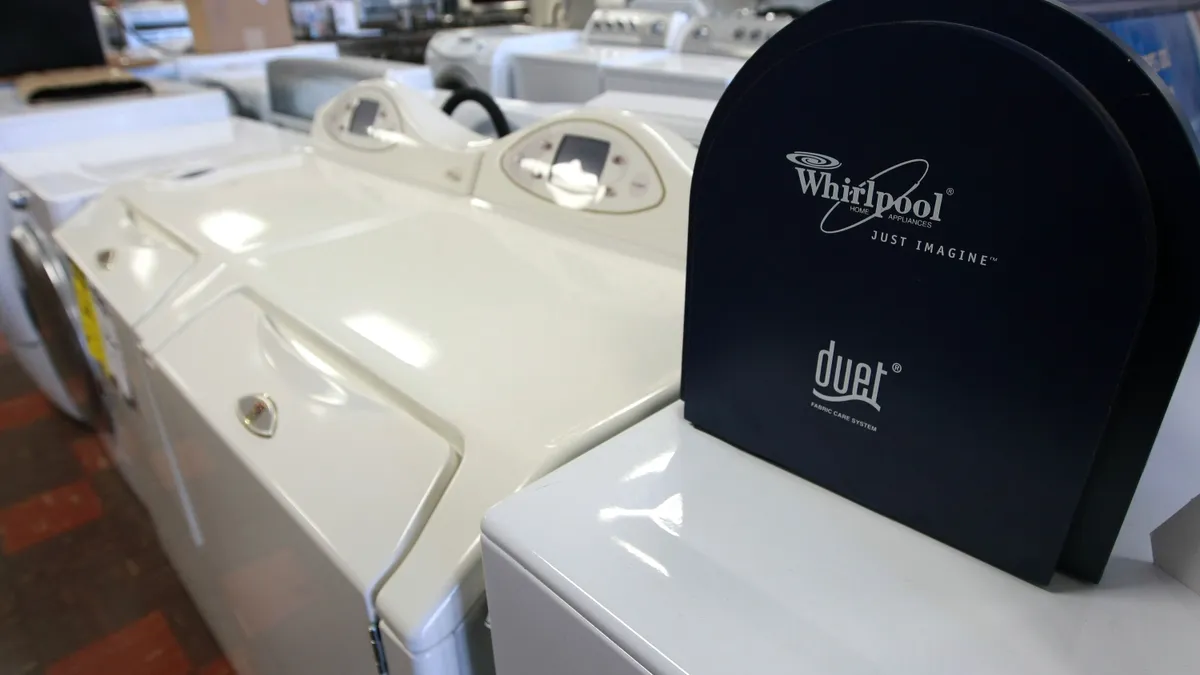Dive Brief:
- The U.S. Department of Energy on Friday proposed new energy efficiency standards for refrigerators and clothes washers that the agency says will save consumers about $3.5 billion annually on energy and water bills.
- Products covered by the proposed rules include residential clothes washers, refrigerators, refrigerator-freezers, and standalone freezers. The new standards could come into effect as soon as 2027, under DOE’s preferred timeline.
- The proposed standards “build on the more than 110 actions the Biden-Harris Administration took in 2022 to strengthen energy efficiency standards,” DOE said in a statement. The agency has faced criticism in the past for falling behind on appliance standards updates.
Dive Insight:
The federal government’s Appliance and Equipment Standards Program reviews efficiency requirements every six years, but it has been more than a decade since rules for refrigerators and clothes washers were last updated.
Standards for refrigerators were last set in 2011, despite DOE being required to consider updating energy efficiency rules by 2017, according to the Appliance Standards Awareness Project. DOE last set standards for clothes washers in 2012, according to the group.
DOE “is catching up here with the incredible technical progress we’ve seen with these products,” ASAP Executive Director Andrew deLaski said in a statement.
“The best models have gotten much more efficient while others still use older technologies that cause higher utility bills each month,” deLaski said. “These standards would ensure that each refrigerator or washing machine at the store is efficient by driving manufacturers to incorporate technologies used in their top-performing products.”
Looking at the appliance standards program broadly, DOE “has dozens of efficiency standards to update in these next two years just to catch up with and meet legal deadlines,” deLaski said. But he said the agency has “a good plan” to address the backlog, pointing to the White House regulatory agenda published in January.
"The administration is going to need to avoid any delays, including from extended White House reviews, to stick to this plan and make those energy cost savings and greenhouse gas emissions reductions a reality,” deLaski said.
The rules proposed Friday are expected to save consumers more than $60 billion over three decades, DOE estimated.
“Households using new refrigerators and clothes washers will save an estimated $425 on their utility bill over the average life of the appliance with these standards in place,” the agency said. “Over the next 30 years, the two rules are expected to reduce carbon dioxide emissions by 233 million metric tons — an amount roughly equivalent to the combined annual emissions of 29 million homes.”
Products covered by the proposed rules account for 5% of annual residential energy use today, DOE said.
Appliance manufacturers said they have some concerns about the proposed standards, as energy efficency requirements for both refrigerators and clothes washers have been updated multuple times over the history of the standards program.
“Our concern is that DOE proposes levels that are rational and allows industry to provide the same features and product selection that consumers across all income levels can afford today,” said Jill Notini, vice president of communications and marketing for the Association of Home Appliance Manufacturers.
This is the 5th generation of standards for refrigerators. Today's products are much larger and use dramatically less energy... This is due to a combination of innovation and DOE standards,” Notini said. ”Clothes washer standards have been updated 6 times. This will be the 7th update - more than any other home appliance category!”
The Natural Resources Defense Council called refrigerators “one of the best efficiency success stories.”
“Thanks to efficiency standards, we have seen fridges get bigger and bigger while using less energy than previous models,” NRDC energy efficiency advocate Joe Vukovich said in a statement. “Fridges can be found in almost every American home, so these savings will go far and wide.”















